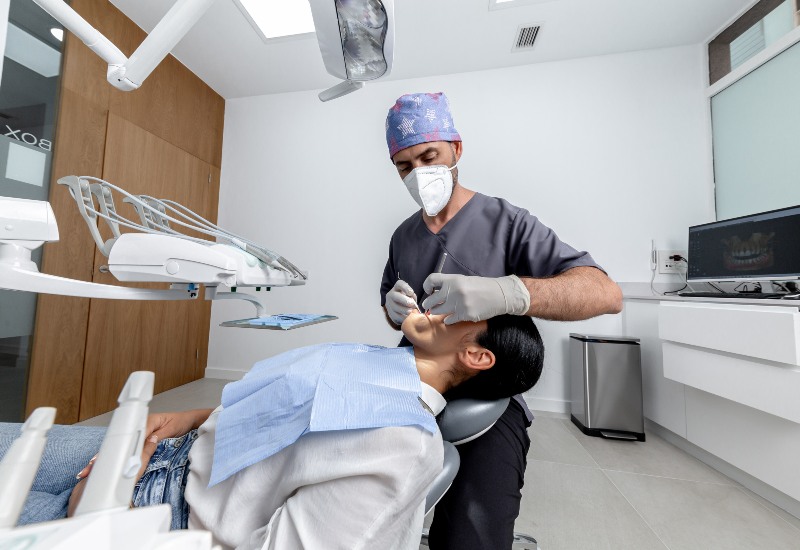Understanding the Difference Between Urgent and Non-Urgent Dental Emergencies
Dental emergencies can be stressful, painful, and confusing—especially when unsure whether your situation requires immediate attention or can wait for a scheduled appointment. At Dental Care of Westlake, we believe that understanding the difference between urgent and non-urgent dental emergencies can help you make informed decisions and protect your oral health.

In this guide, we’ll break down the types of dental emergencies, how to handle them, and when to seek professional help in Westlake, OH.
What Is a Dental Emergency?
A dental emergency refers to any oral health issue that requires prompt attention to alleviate pain, stop bleeding, prevent infection, or save a tooth. These emergencies can range from sudden injuries to lingering issues that worsen over time.
Recognizing the signs early can help you avoid complications and ensure you receive the right care at the right time.
What Are Urgent Dental Emergencies?
Urgent dental care involves situations that need immediate attention from a dentist or the emergency room. These emergencies can be painful, dangerous, or potentially life-threatening if left untreated.
Common Urgent Dental Emergencies Include:
- Severe toothache that doesn’t go away with over-the-counter pain relief
- Knocked-out tooth due to trauma or accident
- Cracked or broken tooth with exposed nerves or bleeding
- Dental abscess or infection causing swelling, fever, or pus
- Bleeding gums or mouth that won’t stop
- Lost dental crown or filling causing pain or sensitivity
- Injury to the jaw or face affecting your ability to chew or speak
If you’re experiencing any of these symptoms, don’t wait. Contact our team immediately to schedule emergency dental services.
What Are Non-Urgent Dental Emergencies?
Non-urgent dental care refers to uncomfortable or inconvenient issues that don’t require immediate treatment. These can typically be managed at home until you can see your dentist.
Examples of Non-Urgent Dental Issues:
- Minor toothache that comes and goes
- Small chip or crack in a tooth without pain
- Lost or loose dental appliance (retainer, mouthguard)
- Food stuck between teeth causing discomfort
- Mild gum irritation or sensitivity
- Stained or discolored teeth
While these problems aren’t emergencies, they still deserve attention. Schedule an appointment with us at your convenience to prevent them from becoming more serious.

How to Handle Dental Emergencies at Home
Until you can get professional help, here are some tips for managing dental emergencies at home:
- Toothache: Rinse with warm salt water and take over-the-counter pain relievers.
- Knocked-out tooth: Keep the tooth moist in milk or saliva and bring it to the dentist immediately.
- Cracked tooth: Avoid chewing on that side and rinse with warm water.
- Bleeding: Apply gentle pressure with gauze and keep your head elevated.
- Swelling: Use a cold compress on the outside of your cheek.
These steps can help reduce pain and prevent further damage while you wait for emergency dental treatment.
When to Call Your Dentist or Visit the ER
Knowing when to go to the emergency dentist versus the ER is crucial. If your symptoms involve:
- Severe bleeding
- Facial trauma
- High fever with swelling
- Difficulty breathing or swallowing
You should go to the emergency room immediately.
For all other dental emergency types, especially those involving teeth, gums, or oral appliances, contact Dental Care of Westlake for emergency dental services. Our experienced team is equipped to handle urgent dental problems and provide fast relief.
Tips for Preventing Dental Emergencies
While not all emergencies can be avoided, many can be prevented with good oral hygiene and smart habits:
- Brush and floss daily to prevent decay and gum disease
- Wear a mouthguard during sports or physical activity
- Avoid chewing hard objects like ice or pens
- Visit your dentist regularly for checkups and cleanings
- Don’t ignore minor issues—they can escalate quickly
Preventive care is your best defense against both urgent and non-urgent dental issues.
Call Us Today
Dental emergencies can happen to anyone, but knowing the difference between urgent and non-urgent situations can help you act quickly and wisely. Whether you’re dealing with a cracked tooth or a severe infection, Dental Care of Westlake provides compassionate and expert care in Westlake, OH.
If you’re experiencing a dental emergency or have questions about your symptoms, don’t wait. Contact our team to get the care you need.
FAQs
Q: What qualifies as an urgent dental emergency?
A: Severe pain, bleeding, infection, or trauma to the teeth or jaw are all signs of urgent dental problems.
Q: Can I treat a toothache at home?
A: Mild toothaches can be managed with saltwater rinses and pain relievers, but persistent pain should be evaluated by a dentist.
Q: Should I go to the ER for a dental emergency?
A: Go to the ER if you have facial trauma, uncontrollable bleeding, or difficulty breathing. For most dental issues, contact your dentist.
Q: How can I prevent dental emergencies?
A: Practice good oral hygiene, wear protective gear during sports, and avoid chewing hard objects.
Q: What should I do if I lose a filling or crown?
A: Keep the area clean, avoid chewing on that side, and contact your dentist as soon as possible.
